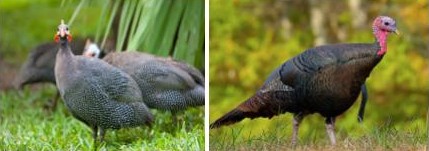by Alastair Hussain
Here's a thought for the Christmas dinner table (assuming you didn't buy goose this year).
Since the 14th century, the English word Turkey has referred to 'the land of the Turks'. Chaucer used it in The Book of the Duchess and wrote it Turkye or Torke.
The word 'Turk' dates back much further: past the French 'Turc', and the Medieval Latin 'Turcus', to the 4th Century Byzantine Greek 'Tourkos' and the Persian 'turk'. The first recorded use of 'Türk' in Old Turkic (a forerunner to modern day Turkish) was found in Göktürk inscriptions from the 8th century.
The original meaning of the word is unclear. In Turkish, 'turk' means strength. But it has, like any good word, meant different things to different people at different times – from 'beautiful youth' to 'barbarian' or even 'robber'.*

So where does a comically bald flightless bird from North America fit into this?
Trade.
And confusion.
The confusion is due to another bird: the guinea fowl.
The guinea fowl is native to East Africa.

[reminder - Guinea fowl on the left, turkey on the right.]
Will the real turkey please stand up?
As you can see, it looks a bit like a turkey. Apparently, they also taste similar.
Before anyone went to America to discover its taxonomic cousin, the guinea fowl was imported to Europe via the Ottoman Empire. So, it became known as the turkey-cock, or turkey-hen.
When settlers in the New World saw fat, bald, flightless** birds that looked like those they knew as 'turkey-cocks' and 'turkey-hens', they used the same name to refer to them.
As the North American bird grew in popularity, it usurped its East African cousin to take the title of 'turkey'.
*Tangentially speaking, here's an oddity: the Chinese words 鐵勒 [铁勒] (tiělēi) or 突厥 (tūjué), were used to refer to a people living south of the Altay mountains from c.177 B.C.E. Coincidence?
** While domesticated turkeys are flightless, wild turkeys are not. They can fly, but the myth that they are flightless started because they feed on the ground. (Information supplied by Dick Hertz)
See: https://www.allaboutbirds.org/guide/wild_turkey/lifehistory
Names of the turkey from around the world
https://en.wikipedia.org/wiki/List_of_names_for_turkeys
Information about the turkey
https://en.wikipedia.org/wiki/Turkey_(bird)
The name of Turkey
https://en.wikipedia.org/wiki/Name_of_Turkey
Alastair Hussain is the Senior Writer and Analyst at Verbal Identity, a brand strategy and language consultancy.
Writing systems | Language and languages | Language learning | Pronunciation | Learning vocabulary | Language acquisition | Motivation and reasons to learn languages | Arabic | Basque | Celtic languages | Chinese | English | Esperanto | French | German | Greek | Hebrew | Indonesian | Italian | Japanese | Korean | Latin | Portuguese | Russian | Sign Languages | Spanish | Swedish | Other languages | Minority and endangered languages | Constructed languages (conlangs) | Reviews of language courses and books | Language learning apps | Teaching languages | Languages and careers | Being and becoming bilingual | Language and culture | Language development and disorders | Translation and interpreting | Multilingual websites, databases and coding | History | Travel | Food | Other topics | Spoof articles | How to submit an article
[top]
You can support this site by Buying Me A Coffee, and if you like what you see on this page, you can use the buttons below to share it with people you know.

If you like this site and find it useful, you can support it by making a donation via PayPal or Patreon, or by contributing in other ways. Omniglot is how I make my living.
Note: all links on this site to Amazon.com, Amazon.co.uk
and Amazon.fr
are affiliate links. This means I earn a commission if you click on any of them and buy something. So by clicking on these links you can help to support this site.
[top]